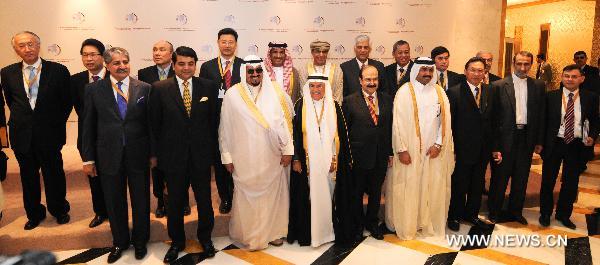KUWAIT CITY, April 18 (Xinhua) — Energy ministers from Asian oil producing and consuming countries on Monday meet in Kuwait City to discuss the latest energy market as oil prices soared around 20 percent amid the unrest in the Middle East and North African region.
Kuwait’s Oil Minister Sheikh Ahmad Al-Abdullah Al-Sabah said late Sunday that “the outlook of the market under the surging prices” would be on the agenda of the one-day event.
He said the global oil market has sufficient supplies as oil prices have increased around 20 percent since the ongoing impasse in OPEC-member Libya has forced the Africa’s major oil exporter to cut back around two thirds of its crude production of 1.6 million barrels per day.
Saudi Arabia said it has the capacity to make up the vacancy left by Libya as ministers said speculation rather than shortage pushed up the oil prices which were relatively stable in the past year.
Saudi Oil Minister Ali Al-Naimi said on arrival in Kuwait late Sunday that global oil market has extra supplies and his country can provide necessary supplies to consumers as demanded.
The world’s largest oil exporter has slashed its daily output from 9.125 million barrels in February to 8.292 million barrels in March, which Al-Naimi said was a proof of the “over-supply.”
The Organization of Petroleum Exporting Countries (OPEC) has kept the current quota unchanged since the end of 2008, when the bloc reduced production to reverse the sliding prices driven by the global financial crisis.
Speculation still lingers whether the oil prices would rise further as the turmoil in Libya shows no signs of an end.
Iran’s Oil Minister Masoud Mirkazemi said Friday the current oil prices are not extraordinary, but logic, as it depends on the market.
State-owned Kuwait Petroleum Corporation CEO Faruk Al-Zanki has said the oil prices would hike further if the turmoil covers all over the Middle East that houses several of the world’s main oil exporters.
The biennial round table talks aimed at boosting the dialogue between oil producer and consumer countries and discuss factors affecting the markets, oil supplies, energy conditions and prices stability.























